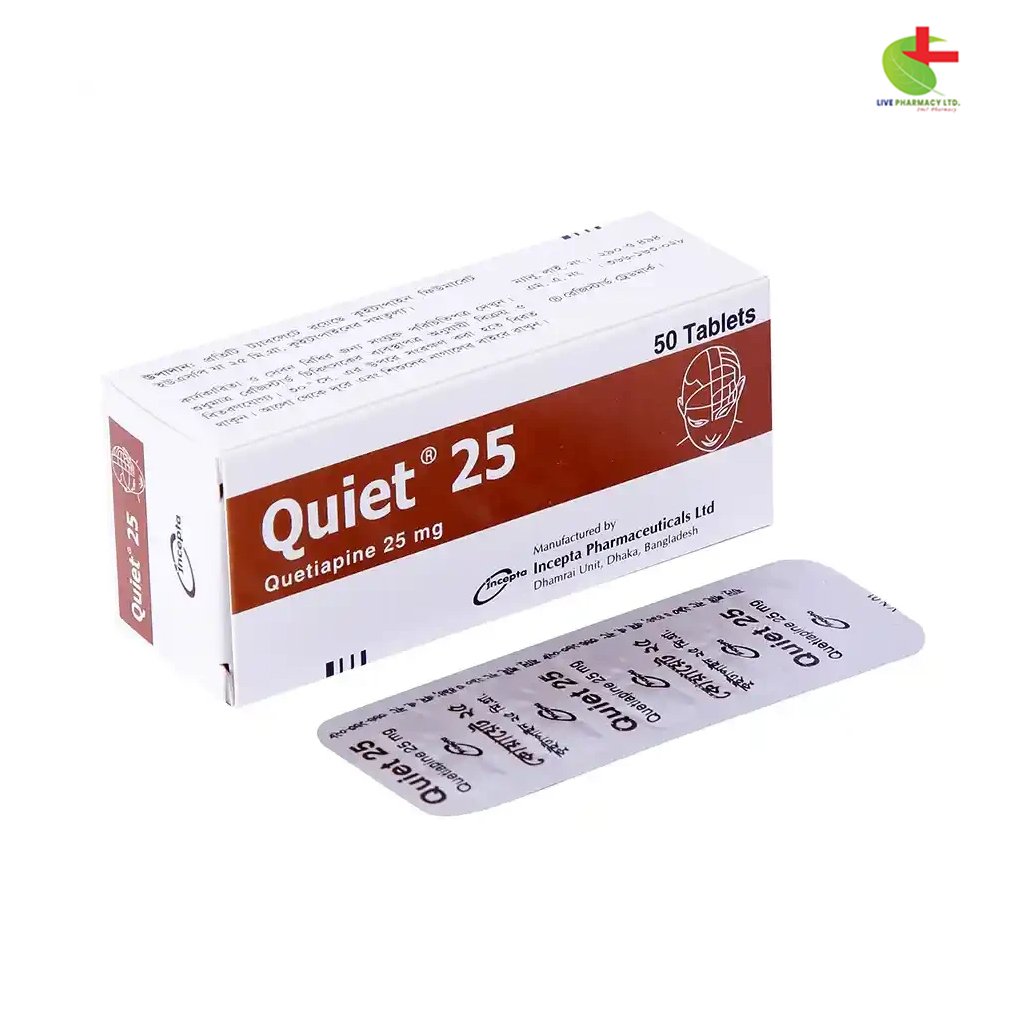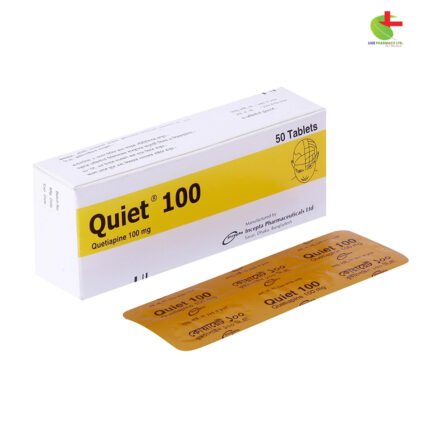Quiet 25
30.00৳ Strip
- Quiet is an atypical antipsychotic medication for acute and chronic psychoses.
- Indicated for schizophrenia and bipolar disorder management.
- Effective in treating manic and depressive episodes.
- Helps prevent recurrence when combined with mood stabilizers.
- Consult a healthcare professional for guidance on usage.
 Brand
Brand
|
Incepta Pharmaceuticals Ltd |
|---|---|
 Generics
Generics
|
Quetiapine Fumarate |
 Type
Type
|
Tablet |
Indications
Quiet is prescribed for the management of both acute and chronic psychoses, including schizophrenia and bipolar disorder. It is effective in treating manic episodes that meet DSM-IV criteria, depressive episodes associated with bipolar disorder, and is used in combination with mood stabilizers for maintenance therapy to prevent the recurrence of manic, depressive, or mixed episodes.
Consult a registered physician for medication advice.
Pharmacology
Quetiapine Fumarate is an atypical antipsychotic belonging to the dibenzothiazepine class. It acts as an antagonist at various neurotransmitter receptors in the brain, including serotonin 5HT1A, 5HT2, dopamine D1, D2, and adrenergic α1 and α2 receptors, while showing little affinity for cholinergic muscarinic and benzodiazepine receptors. Although the exact mechanism of action is not fully understood, its therapeutic effects in schizophrenia are believed to arise from a combination of dopamine D2 and serotonin 5HT2 antagonism. Quetiapine also antagonizes histamine H1 receptors, which may contribute to its sedative effects.
Dosage & Administration
For the treatment of acute and chronic psychoses, Quetiapine should be taken twice daily, with or without food. The initial dosages over the first four days are as follows: Day 1: 50 mg, Day 2: 100 mg, Day 3: 200 mg, and Day 4: 300 mg. After this, adjust the dosage within the range of 300-450 mg/day based on clinical response and patient tolerability, up to a maximum of 750 mg/day.
For manic episodes in bipolar disorder, the initial dosage is 100 mg on Day 1, increasing to 200 mg on Day 2, 300 mg on Day 3, and 400 mg on Day 4. Dosage can be adjusted to a maximum of 800 mg/day by Day 6, depending on response.
For depressive episodes related to bipolar disorder, administer once daily at bedtime, starting with 50 mg on Day 1, and increasing to a usual dose of 300 mg by Day 4. Further titration can be considered, with efficacy shown at doses of 300 mg and 600 mg.
For maintenance therapy in bipolar I disorder combined with mood stabilizers, continue at the effective dose based on previous response.
Consult a registered physician for medication advice.
Interactions
Caution is advised when using Quiet alongside medications that may cause electrolyte imbalances or prolong the QT interval. Co-administration with thioridazine or carbamazepine can increase Quiet’s clearance.
Contraindications
Quetiapine is contraindicated for individuals hypersensitive to its components.
Side Effects
Common side effects include somnolence, dizziness, dry mouth, withdrawal symptoms, and alterations in cholesterol levels, as well as potential weight gain and extrapyramidal symptoms.
Pregnancy & Lactation
The safety of Quetiapine during pregnancy is not established; it should only be used if benefits outweigh potential risks. It is also advised to avoid breastfeeding while taking this medication.
Precautions & Warnings
Use caution in patients with cardiovascular issues, a history of seizures, or those prone to orthostatic hypotension. Monitor for signs of tardive dyskinesia and consider dose adjustments if necessary. Close observation is essential in elderly patients due to altered pharmacokinetics.
Overdose Effects
In cases of overdose, there is no specific antidote, but supportive measures are crucial. Symptoms may include sedation, hypotension, and respiratory distress. Medical supervision is required until recovery.
Storage Conditions
Store in a cool, dry place away from light, and keep out of reach of children. Do not use after the expiry date.













Reviews
There are no reviews yet.